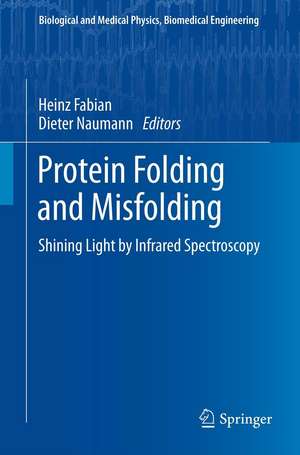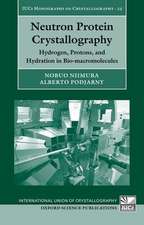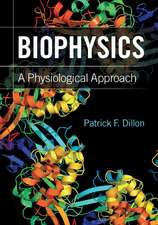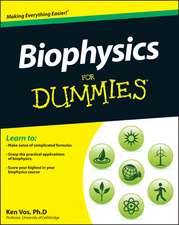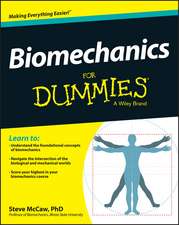Protein Folding and Misfolding: Shining Light by Infrared Spectroscopy: Biological and Medical Physics, Biomedical Engineering
Editat de Heinz Fabian, Dieter Naumannen Limba Engleză Paperback – 26 noi 2013
| Toate formatele și edițiile | Preț | Express |
|---|---|---|
| Paperback (1) | 638.76 lei 6-8 săpt. | |
| Springer Berlin, Heidelberg – 26 noi 2013 | 638.76 lei 6-8 săpt. | |
| Hardback (1) | 641.71 lei 6-8 săpt. | |
| Springer Berlin, Heidelberg – 17 sep 2011 | 641.71 lei 6-8 săpt. |
Din seria Biological and Medical Physics, Biomedical Engineering
- 5%
 Preț: 1110.32 lei
Preț: 1110.32 lei - 18%
 Preț: 1006.55 lei
Preț: 1006.55 lei - 18%
 Preț: 960.78 lei
Preț: 960.78 lei - 18%
 Preț: 704.10 lei
Preț: 704.10 lei - 18%
 Preț: 967.40 lei
Preț: 967.40 lei - 18%
 Preț: 948.92 lei
Preț: 948.92 lei - 15%
 Preț: 641.71 lei
Preț: 641.71 lei - 15%
 Preț: 644.95 lei
Preț: 644.95 lei - 15%
 Preț: 665.08 lei
Preț: 665.08 lei - 18%
 Preț: 1669.16 lei
Preț: 1669.16 lei - 18%
 Preț: 941.05 lei
Preț: 941.05 lei - 18%
 Preț: 956.81 lei
Preț: 956.81 lei - 18%
 Preț: 950.21 lei
Preț: 950.21 lei - 15%
 Preț: 636.80 lei
Preț: 636.80 lei - 18%
 Preț: 947.50 lei
Preț: 947.50 lei - 15%
 Preț: 636.80 lei
Preț: 636.80 lei -
 Preț: 397.01 lei
Preț: 397.01 lei - 18%
 Preț: 1236.99 lei
Preț: 1236.99 lei - 15%
 Preț: 644.49 lei
Preț: 644.49 lei - 18%
 Preț: 946.55 lei
Preț: 946.55 lei - 15%
 Preț: 712.22 lei
Preț: 712.22 lei - 18%
 Preț: 952.89 lei
Preț: 952.89 lei - 18%
 Preț: 944.36 lei
Preț: 944.36 lei - 18%
 Preț: 1228.29 lei
Preț: 1228.29 lei - 5%
 Preț: 1422.67 lei
Preț: 1422.67 lei - 18%
 Preț: 1393.27 lei
Preț: 1393.27 lei - 15%
 Preț: 651.19 lei
Preț: 651.19 lei - 18%
 Preț: 953.65 lei
Preț: 953.65 lei - 18%
 Preț: 955.88 lei
Preț: 955.88 lei - 15%
 Preț: 644.95 lei
Preț: 644.95 lei - 5%
 Preț: 1098.48 lei
Preț: 1098.48 lei - 18%
 Preț: 959.19 lei
Preț: 959.19 lei - 15%
 Preț: 643.65 lei
Preț: 643.65 lei - 5%
 Preț: 1159.16 lei
Preț: 1159.16 lei - 5%
 Preț: 1102.67 lei
Preț: 1102.67 lei - 18%
 Preț: 952.09 lei
Preț: 952.09 lei - 18%
 Preț: 946.55 lei
Preț: 946.55 lei - 18%
 Preț: 952.09 lei
Preț: 952.09 lei - 15%
 Preț: 703.20 lei
Preț: 703.20 lei - 18%
 Preț: 953.65 lei
Preț: 953.65 lei - 5%
 Preț: 1008.41 lei
Preț: 1008.41 lei - 15%
 Preț: 644.82 lei
Preț: 644.82 lei - 18%
 Preț: 956.03 lei
Preț: 956.03 lei - 15%
 Preț: 647.40 lei
Preț: 647.40 lei
Preț: 638.76 lei
Preț vechi: 751.47 lei
-15% Nou
Puncte Express: 958
Preț estimativ în valută:
122.23€ • 127.88$ • 101.53£
122.23€ • 127.88$ • 101.53£
Carte tipărită la comandă
Livrare economică 02-16 aprilie
Preluare comenzi: 021 569.72.76
Specificații
ISBN-13: 9783642270574
ISBN-10: 3642270573
Pagini: 260
Ilustrații: XVI, 244 p.
Dimensiuni: 155 x 235 x 14 mm
Greutate: 0.37 kg
Ediția:2012
Editura: Springer Berlin, Heidelberg
Colecția Springer
Seria Biological and Medical Physics, Biomedical Engineering
Locul publicării:Berlin, Heidelberg, Germany
ISBN-10: 3642270573
Pagini: 260
Ilustrații: XVI, 244 p.
Dimensiuni: 155 x 235 x 14 mm
Greutate: 0.37 kg
Ediția:2012
Editura: Springer Berlin, Heidelberg
Colecția Springer
Seria Biological and Medical Physics, Biomedical Engineering
Locul publicării:Berlin, Heidelberg, Germany
Public țintă
GraduateCuprins
Reconstruction of the Amide I contour in the IR spectra of proteins: From structure to spectrum; R.Mendelsohn (USA).- Millisecond-to-minute time-resolved protein folding/misfolding events monitored by FTIR spectroscopy; H. Fabian & D. Naumann (Germany).- Sub-millisecond events in proteins probed by continuous-flow FTIR experiments; S. Takahashi (Japan).- Protein folding/misfolding at high pressure probed by FTIR spectroscopy; R. Winter (Germany).-Site-specific relaxation kinetics of peptides using temperature-jump IR spectroscopy and isotopic labelling; A. Barth (Sweden), K.Hauser (Germany).- Nanosecond-to-millisecond time-resolved nonlinear infrared spectroscopy of proteins;M. Zanni (USA).- Light triggered peptide dynamics; W. Zinth & J. Wachtveitl (Germany).-Dynamics of alpha helix and beta-sheet formation; K. Hauser.- Time-resolved FTIR spectroscopy of peptides; A. Peralvarez-Martin, J. E.T. Corrie, A. Barth.-High pressure vibrationals spectroscopy of folding and misfolding proteins; M. Puehse, J. Markgraf, R. Winter
Notă biografică
Prof. Dr. Dieter Naumann is the head of biomedical spectroscopy at the Robert Koch Institute Berlin
Textul de pe ultima copertă
Infrared spectroscopy is a new and innovative technology to study protein folding/misfolding events in the broad arsenal of techniques conventionally used in this field. The progress in understanding protein folding and misfolding is primarily due to the development of biophysical methods which permit to probe conformational changes with high kinetic and structural resolution. The most commonly used approaches rely on rapid mixing methods to initiate the folding event via a sudden change in solvent conditions. Traditionally, techniques such as fluorescence, circular dichroism or visible absorption are applied to probe the process. In contrast to these techniques, infrared spectroscopy came into play only very recently, and the progress made in this field up to date which now permits to probe folding events over the time scale from picoseconds to minutes has not yet been discussed in a book. The aim of this book is to provide an overview of the developments as seen by some of the main contributors to the field. The chapters are not intended to give exhaustive reviews of the literature but, instead to illustrate examples demonstrating the sort of information, which infrared techniques can provide and how this information can be extracted from the experimental data. By discussing the strengths and limitations of the infrared approaches for the investigation of folding and misfolding mechanisms this book helps the reader to evaluate whether a particular system is appropriate for studies by infrared spectroscopy and which specific advantages the techniques offer to solve specific problems.
Caracteristici
Study of protein folding and misfolding Probe folding events over the time scale from picoseconds to minutes Overview of the developments of infrared spectroscopy for protein studies Strengths, advantages and limitations of infrared techniques described Includes supplementary material: sn.pub/extras
